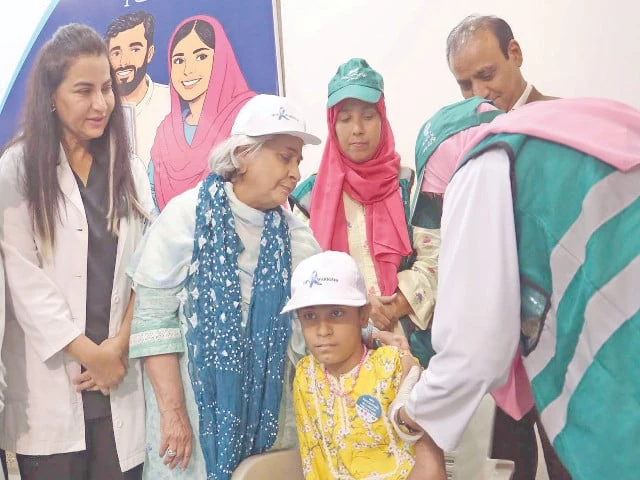The human papillomavirus -vaccination campaign over Karachi and the rest of Sindh has been expanded by three days. During the 12-day drive, 59% of the eligible girls were vaccinated, while sessions continue in schools to cover the remaining 41%. Mobile teams have also been asked to continue collecting activities.
The Human Papillomavirus (HPV) Vaccination campaign ran from 15 to 27 September, the one -time vaccination drive set a target of 395,609 girls. Of these, 307,421 were vaccinated.
According to a letter issued by the project manager for Sindh’s extended program on immunization (EPI), Dr. Raj Kumar, 59% of targeted girls vaccine in the first 12 days. To reach the set goal, Sindh Health Department has expanded the campaign from September 29 (today) until October 1st. Particular focus will be given to the union councils, where a higher number of girls remain unvaccinated.
School sessions continue in areas where coverage is below 80%or where teams have not yet been reached. Field teams and supervisors have been instructed to participate in collection activities without further budget. The education department will remain engaged in improving school access.
Deputy Commissioners will oversee the district level collection activities. Social leaders, teachers, parents and religious scholars will be involved in consciousness sessions to increase public support and confidence in the vaccine. Civil society organizations will help expand society’s outreach. Health centers and district authorities will also maintain proper records of used vaccine hood.
The vaccine drives the results left much to be desired, with rumors and false information that prevents the targeted number set by government institutions. The Ministry of Health must be celebrated for the efforts made to combat this propaganda. The campaign was dependent on pediatricians, gynecologists and front line workers to inform societies of HPV and the prevention of cervical cancer.
Read: That shot they fear: HPV vaccine and that uphill match
However, the number obtained by vaccine -driven could not match the government’s expectations. The campaign completed and achieved 77.1% of its goal. Despite the drive, nearly 89,000 girls could not be vaccinated due to parents’ refusal, absence from home or school and illness.
The HPV vaccine campaign has been shrouded in controversy since the start. Political leaders are spreading false propaganda about it, which has led to many parents preventing thousands of children from receiving the shot.
The false rumors had become so potent that senior members as Federal Health Minister Mustafa Kamal on publicly vaccinated her daughter to remove rumors and misinformation about the cervical cancer vaccine and said the vaccine is safe and important to protect future generations. “To counter this misleading tale, I have had my own daughter, Raja Kamal, vaccinated in front of the media to show that there is nothing to fear,” he added.
It helped, but not much. Parents slammed their doors on health workers and some schools closed in days over false claims that it causes infertility.
The popular leader of a right -wing religious party, Rashid Mehmood Somro, said the voluntary vaccine was forced to girls by the government. “In fact, our daughters are made barren,” he told a demonstration in Karachi.
Read more: Sindh rolls out of HPV vaccine that addresses technical, not social gaps
These statements repeat a lot of the inaccurate tales bound to the polio vaccine drive. In the 2010s. Such an infertility propaganda had filled the polio vaccine campaign, which led to the National Research and Development Foundation (NRDF) to release a statement relating to the false information. Pakistan is one of the last two countries in the world together with Afghanistan, where polio still remains endemic despite global efforts to eradicate the virus.
The conspiracy theory that Western produced vaccines are used to limit the Muslim population, first appeared during the polio campaign and is now witnessing a resuscitation with the start of the HPV vaccine drive.
“Some people have refused, closed their gates on us and even hidden information about their daughter’s age,” vaccinator Ambreen Zehra told AFP while he was door to door in a neighborhood of lower average income in Karachi.
Pakistan’s relationship with vaccines has, to say the least, been riotous. Pakistan is currently the second largest country with the highest number of children with zero doses vaccines in South Asia, of which number one is India. A study conducted by the British medical journal Lancet found that Pakistan had 419,000 children who fell into the zero vaccine category.



